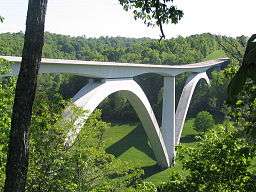Natchez Trace Parkway Bridge
| Natchez Trace Parkway Bridge | |
|---|---|
 The Natchez Trace Parkway Bridge, viewed from the north | |
| Coordinates | 35°59′12″N 86°59′32″W / 35.9866°N 86.9923°W |
| Carries |
|
| Crosses |
|
| Locale | Williamson County, Tennessee |
| Maintained by | National Park Service[1] |
| ID number | 5570463P0000000 |
| Characteristics | |
| Design | Arch |
| Total length | 479.1 m (1,572 ft) [1] |
| Width | 11.3 m (37 ft) [2] |
| Height | 44.2 m (145 ft) [2] |
| Longest span | 177.4 m (582 ft) [1] |
| Clearance below | 32.7 m (107 ft) [1] |
| History | |
| Opened | March 22, 1994 |
| Statistics | |
| Daily traffic | 210 (in 1997) [1] |
| Toll | none |
The Natchez Trace Parkway Bridge is a concrete double arch bridge located in Williamson County, Tennessee, 14 km (8.7 mi) from the northern terminus of the Natchez Trace Parkway. It is 479.1 m (1,572 ft) long and carries the two-lane Natchez Trace Parkway 44.2 m (145 ft) over State Route 96 and a heavily wooded valley. The 177.4 m (582 ft) long main span is symmetrical, while the 140.8 m (462 ft) long second arch is not, due to the slope of the valley at the southern end of the bridge.[2] The bridge is rare in that it does not use spandrel columns to support the deck from the arch. Rather than being evenly distributed along the arch's length, the weight of the bridge is concentrated at the crown of the arch. The lack of spandrel columns results in a clean, unencumbered appearance: it is termed a cathedral arch bridge.
The bridge, also known as the Natchez Trace Parkway Arches, is the first segmentally constructed concrete arch bridge in the United States.[2] The arches comprise 122 hollow box segments precast in nearby Franklin, each of which was about 3 m (9.8 ft) long and weighed between 26 and 41 metric tons (29 and 45 short tons) .[2] The deck consists of 196 precast post-tensioned trapezoidal box girder segments, each typically 2.6 m (8.5 ft) long. The sections atop the crown of the arch are 3.9 m (13 ft) deep.[2] The foundations and piers of the bridge were cast in place.[2]
The bridge was designed by Figg Engineering Group and built by PCL Civil Constructors Inc., a subsidiary of PCL Constructors Inc. The arches and deck were constructed using a balanced cantilever method. Each arch was supported by temporary cable stays anchored from the top of the piers and the valley sides until it was fully built.[2] This procedure was chosen in place of conventional shoring towers so that environmental damage to the valley would be minimized.[3] The bridge cost US$11.3 million to build,[4] and was completed in October 1993.[2] It was officially opened on March 22, 1994.[5]
The bridge has won many awards for its design, including a Presidential Award for Design Excellence in 1995,[6] and an Award of Merit from the Federal Highway Administration in 1996.[7] The Eleventh International Bridge Conference named it the single most outstanding achievement in the bridge industry for 1994.[8] The bridge "impressed the... jury with its aesthetically striking double-arch design, which shows exceptional sensitivity to the historical context of the site."[9]
Gallery
.jpg) The bridge viewed from State Route 96, looking southeast
The bridge viewed from State Route 96, looking southeast
References
| Wikimedia Commons has media related to Natchez Trace Parkway Bridge. |
- 1 2 3 4 5 "National Bridge Inventory Database".
- 1 2 3 4 5 6 7 8 9 Corven, John A.; John W. Jordan Jr. (November 1993). "Arches for a parkway". Civil Engineering. American Society of Civil Engineers. 63 (11): 44–47.
- ↑ "Natchez Trace Parkway Bridge over Tennessee Route 96.". Archived from the original on 2006-03-11.
- ↑ Natchez Trace Parkway Arches at Structurae
- ↑ "Finley McNary Bridge Engineering Projects". Archived from the original on 2003-08-23.
- ↑ "Figg Engineering Group". Archived from the original on 2003-12-13.
- ↑ "Excellence in Highway Design 1997". Federal Highway Administration, U.S. Department of Transportation.
- ↑ "International Bridge Conference: Bridge Awards.".
- ↑ Goldstein, Harry (July 1995). "Triumphant Arches". Civil Engineering. American Society of Civil Engineers. 65 (7): 48–49. Retrieved 2011-03-15.